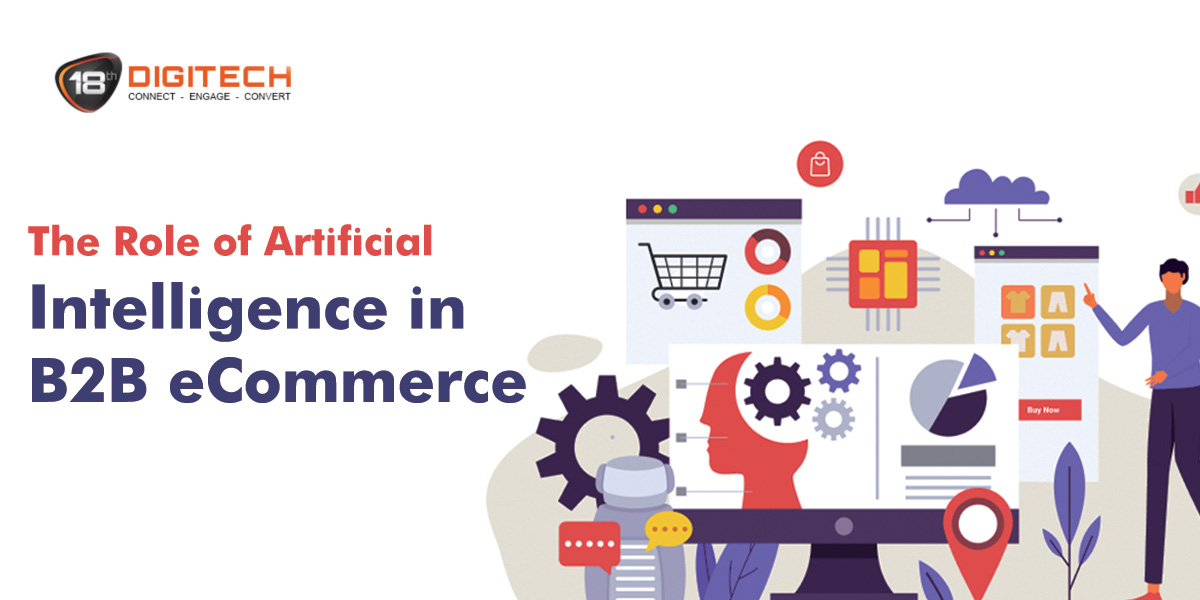In the world of commerce, B2B eCommerce is witnessing a revolution, thanks to the integration of artificial intelligence (AI) into its ecosystem. Businesses today are experiencing the transformative power of AI in optimizing their B2B eCommerce services. AI, coupled with B2B eCommerce development services provided by specialized agencies, is reshaping the way businesses operate and interact with one another.
In this blog, we will explore the significant role that AI plays in B2B eCommerce and how B2B eCommerce agencies are leveraging it to deliver cutting-edge solutions.
What is AI?
Artificial Intelligence, commonly referred to as AI, is a branch of computer science that focuses on creating systems and machines capable of performing tasks that typically require human intelligence. These tasks include problem-solving, learning, reasoning, understanding natural language, and adapting to new situations. AI systems use algorithms and data to make decisions, and they can improve their performance over time through machine learning. AI has a wide range of applications, from virtual assistants like Siri and Alexa to self-driving cars, medical diagnosis, and recommendation systems. It plays a pivotal role in today’s technology-driven world, and its continued development promises to revolutionize numerous industries and aspects of our daily lives.
B2B Businesses That Can Benefit from AI
Various B2B (Business-to-Business) industries and businesses can benefit from the incorporation of AI (Artificial Intelligence) into their operations. Here are some examples of B2B businesses that can harness the power of AI to their advantage:
- Manufacturing and Supply Chain Management: AI can optimize production schedules, predict maintenance needs, and streamline supply chain logistics for manufacturers and distributors.
- Logistics and Transportation: B2B logistics companies can use AI to optimize route planning, improve demand forecasting, and enhance real-time tracking and delivery scheduling.
- Healthcare: Hospitals, medical equipment suppliers, and pharmaceutical companies can benefit from AI-driven solutions for patient data analysis, drug discovery, and inventory management.
- Finance and Banking: AI can assist in risk assessment, fraud detection, algorithmic trading, and customer service for B2B financial institutions.
- Retail and Wholesale: Wholesale distributors and B2B suppliers can utilize AI for demand forecasting, inventory management, and personalized product recommendations.
- Marketing and Advertising Agencies: B2B marketing agencies can leverage AI for customer segmentation, programmatic advertising, content generation, and performance analysis.
- Information Technology: IT service providers can use AI for network security, automation of routine IT tasks, and predictive maintenance.
- Real Estate: Commercial real estate firms can benefit from AI-driven property management, lease optimization, and predictive analytics for property values.
- Legal Services: AI can assist legal firms in contract analysis, legal research, and document review, increasing efficiency and accuracy.
- Human Resources and Recruitment: B2B HR and recruitment firms can use AI for resume screening, candidate matching, and workforce analytics.
- Energy and Utilities: AI can optimize energy consumption, predict equipment failures, and improve resource allocation for B2B energy and utility companies.
- Hospitality and Event Management: Event planning companies and B2B hospitality providers can employ AI for guest services, demand forecasting, and event scheduling.
- Agriculture: B2B agricultural businesses can benefit from AI-driven precision agriculture, crop monitoring, and predictive maintenance of equipment.
- Construction and Engineering: AI can assist in project management, design optimization, and equipment maintenance for B2B construction and engineering companies.
- Telecommunications: Telecom service providers can enhance network management, predict equipment failures, and improve customer service with AI.
Role of AI in B2B eCommerce
AI plays a pivotal role in B2B eCommerce, offering a multitude of benefits to businesses in this sector:
- Enhanced Customer Experience: AI-powered chatbots and virtual assistants provide real-time support, answer inquiries, and offer personalized product recommendations, improving the customer’s journey and increasing satisfaction.
- Predictive Analytics: AI can analyze historical data to forecast trends, inventory requirements, and demand patterns. This helps optimize supply chains, reduce costs, and improve inventory management.
- Personalization: AI analyses customer behavior, preferences, and purchase history to provide tailored product recommendations and content. This personalized approach enhances engagement and drives higher conversion rates.
- Streamlined Search and Navigation: AI improves search and navigation on B2B eCommerce platforms by using natural language processing and machine learning algorithms to understand and respond to complex search queries.
- Recommendation Systems: AI-powered recommendation engines analyze user behavior and preferences to suggest relevant products, increasing cross-selling and upselling opportunities.
- Dynamic Pricing: AI algorithms can adjust pricing in real-time based on various factors, such as demand, competitor pricing, and inventory levels, allowing for more competitive pricing strategies.
- Inventory Management: AI can help businesses maintain optimal inventory levels by predicting demand and automating reordering processes, reducing carrying costs and minimizing stockouts.
- Order Processing: Automation of order processing through AI can streamline workflows, reducing errors and improving efficiency.
- Supply Chain Optimization: AI can enhance supply chain management by predicting disruptions, optimizing routes, and improving demand forecasting.
- Fraud Detection: Machine learning models can detect unusual transaction patterns and flag potentially fraudulent activities in real-time, safeguarding B2B transactions.
- Customer Insights: AI can analyze customer data to provide valuable insights into purchasing behavior, helping businesses tailor their marketing strategies and product offerings.
- Marketplace Recommendations: AI-driven insights can help B2B marketplaces suggest relevant suppliers, products, and services to buyers and promote the growth of the ecosystem.
- Content Generation: AI can automate the creation of product descriptions, reviews, and marketing materials, saving time and resources.
- Compliance and Security: AI can assist in monitoring and ensuring compliance with industry regulations and cybersecurity protocols, protecting sensitive B2B data.
- Customer Support: AI-powered virtual assistants can offer 24/7 customer support, addressing common queries and issues, and routing complex inquiries to human agents.
How to Incorporate AI into B2B eCommerce?
Incorporating AI into B2B (Business-to-Business) eCommerce can significantly enhance your business operations, streamline processes, and provide valuable insights to serve your clients better. Here’s a guide on how to effectively integrate AI into your B2B eCommerce platform:
- AI-Driven Product Recommendations: Implement recommendation engines that use AI algorithms to analyze customer purchase history and behavior. This helps in suggesting products relevant to their needs, increasing cross-selling opportunities.
- Chatbots and Virtual Assistants: Integrate AI-powered chatbots and virtual assistants to provide real-time support. These tools can answer inquiries, assist with navigation, and offer personalized assistance to your B2B customers.
- Predictive Analytics: Use AI to analyze historical data and predict trends, demand patterns, and inventory requirements. This is essential for optimizing supply chain management and inventory levels.
- Personalized Customer Experiences: Leverage AI to create personalized experiences for your B2B clients. Analyze customer data to tailor product recommendations, marketing content, and promotions to individual preferences.
- Automated Inventory Management: Automate inventory management using AI to optimize stock levels, reduce carrying costs, and minimize stockouts based on predictive analytics and demand forecasting.
- Dynamic Pricing: Utilize AI algorithms to set dynamic pricing. Adjust product prices in real-time based on factors such as demand, competitor pricing, and inventory levels to remain competitive.
- Streamlined Search and Navigation: Improve search and navigation features on your B2B eCommerce platform using AI. Natural language processing and machine learning can help users find products more efficiently.
- Customer Segmentation: Segment your B2B customers with AI to create targeted marketing campaigns, product offerings, and promotions that align with the specific needs and preferences of different client groups.
- Order Processing Automation: Implement AI for order processing automation to streamline workflows, reduce errors, and improve efficiency in managing B2B transactions.
- Supply Chain Optimization: Use AI to optimize supply chain management, predict disruptions, optimize routes, and improve demand forecasting to ensure efficient and cost-effective operations.
- Fraud Detection: Protect your B2B transactions with AI-driven fraud detection systems. Machine learning models can detect unusual transaction patterns and flag potentially fraudulent activities in real-time.
- Customer Insights: Analyze B2B customer data with AI to gain insights into their purchasing behavior, helping you make data-driven decisions regarding product offerings and marketing strategies.
- Content Generation: Automate the creation of product descriptions, reviews, and marketing content using AI, saving time and ensuring consistent content quality.
- Customized Pricing and Quoting: Use AI to create customized pricing and quoting systems for your B2B clients, tailoring pricing based on individual or bulk purchases, contract terms, or other relevant factors.
- AI-Powered Customer Support: Provide AI-driven customer support solutions, offering 24/7 assistance for common inquiries, and effectively routing complex issues to human agents.
Wrapping Up,
Artificial intelligence is fundamentally transforming B2B eCommerce, with B2B eCommerce agencies at the forefront of this revolution. By leveraging AI’s capabilities, these agencies can deliver B2B eCommerce development services that enhance the customer experience, enable predictive analytics, offer personalized interactions, streamline search and navigation, and prevent fraud. As businesses continue to embrace AI, they position themselves for growth, competitiveness, and success in the evolving B2B eCommerce landscape. The synergy of AI and B2B eCommerce is a testament to the limitless potential of technology in revolutionizing how businesses operate and connect in the digital age.








 About 18th Digitech
About 18th Digitech Awards and Credentials
Awards and Credentials Our Partners
Our Partners Press/Events
Press/Events
